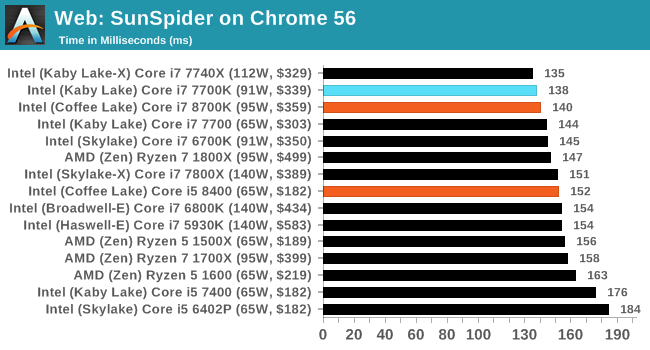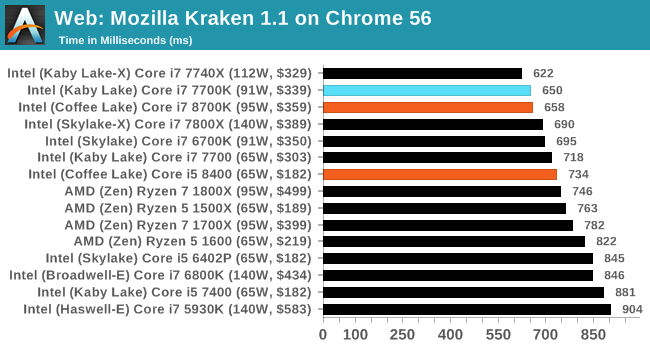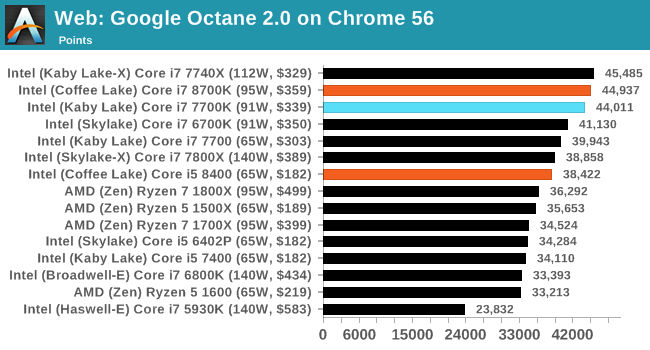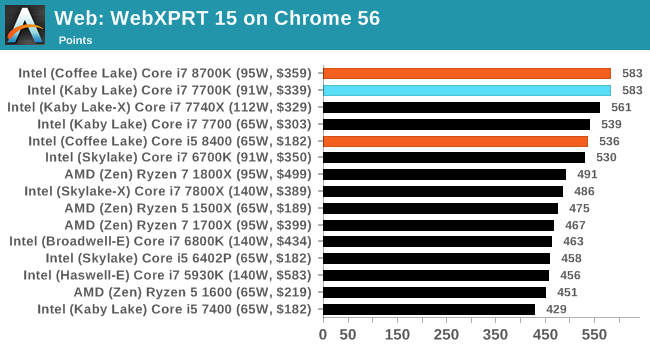The AnandTech Coffee Lake Review: Initial Numbers on the Core i7-8700K and Core i5-8400
by Ian Cutress on October 5, 2017 9:00 AM EST- Posted in
- CPUs
- Intel
- Core i5
- Core i7
- Core i3
- 14nm
- Coffee Lake
- 14++
- Hex-Core
- Hyperthreading
Benchmarking Performance: CPU Web Tests
One of the issues when running web-based tests is the nature of modern browsers to automatically install updates. This means any sustained period of benchmarking will invariably fall foul of the 'it's updated beyond the state of comparison' rule, especially when browsers will update if you give them half a second to think about it. Despite this, we were able to find a series of commands to create an un-updatable version of Chrome 56 for our 2017 test suite. While this means we might not be on the bleeding edge of the latest browser, it makes the scores between CPUs comparable.
All of our benchmark results can also be found in our benchmark engine, Bench.
SunSpider 1.0.2: link
The oldest web-based benchmark in this portion of our test is SunSpider. This is a very basic javascript algorithm tool, and ends up being more a measure of IPC and latency than anything else, with most high-performance CPUs scoring around about the same. The basic test is looped 10 times and the average taken. We run the basic test 4 times.

Mozilla Kraken 1.1: link
Kraken is another Javascript based benchmark, using the same test harness as SunSpider, but focusing on more stringent real-world use cases and libraries, such as audio processing and image filters. Again, the basic test is looped ten times, and we run the basic test four times.

Google Octane 2.0: link
Along with Mozilla, as Google is a major browser developer, having peak JS performance is typically a critical asset when comparing against the other OS developers. In the same way that SunSpider is a very early JS benchmark, and Kraken is a bit newer, Octane aims to be more relevant to real workloads, especially in power constrained devices such as smartphones and tablets.

WebXPRT 2015: link
While the previous three benchmarks do calculations in the background and represent a score, WebXPRT is designed to be a better interpretation of visual workloads that a professional user might have, such as browser based applications, graphing, image editing, sort/analysis, scientific analysis and financial tools.











222 Comments
View All Comments
zuber - Thursday, October 5, 2017 - link
I disagree, he mentioned pretty much all the info you need to know about the CPU.The choice of GPU is hardly even relevant to CPU tests anymore. For gaming performance my 6 year old i7-2600K is neck and neck (or faster in some cases) than this new crop of CPUs.
mapesdhs - Friday, October 6, 2017 - link
And if you do need more cores you can always move sideways to a very low cost SB-E or IB-EP. I built a 4.8GHz 2700K system for a friend two years ago, am upgrading it soon to a 3930K at the same clock, replacing the M4E mbd with an R4E, swapping the RAM kits (2x8GB for 4x4GB, both 2400MHz), total cost 200 UKP. 8) And the both mbds now have the option of booting from NVMe.Newer CPUs can have a distinct advantage for some types of 1080p gaming, but with newer GPUs the frame rates are usually so high it really doesn't matter. Move up the scale of resolution/complexity and quickly it becomes apparent there's plenty of life left in SB, etc. zuber, at what clock are you running your 2600K? Also note that P67/Z68 can benefit aswell from faster RAM if you're only using 1600 or less atm.
Itveryhotinhere - Thursday, October 5, 2017 - link
Not yet have power consumption graph ?Ryan Smith - Thursday, October 5, 2017 - link
It's there: https://www.anandtech.com/show/11859/the-anandtech...Itveryhotinhere - Thursday, October 5, 2017 - link
ThanksItveryhotinhere - Thursday, October 5, 2017 - link
That power consumption at full load already use boost or only at base clock ?Ian Cutress - Thursday, October 5, 2017 - link
All-core turbo, as always.SunnyNW - Thursday, October 5, 2017 - link
Can you please tell me how you got to the +20% frequency for CPU B in the twitter poll?mkaibear - Friday, October 6, 2017 - link
Yeah that doesn't make a lot of sense to me either.CPU A is the 8600K. Runs at a base of 3.6 and an all-core turbo of 4.1.
CPU B is the 8700. Runs at a base of 3.2 and an all-core turbo of 4.3.
That's either 11% slower (base) or about 5% faster (all-core turbo). Neither is 20%!
If you compare the base speed of the 8600K and the all-core turbo speed of the 8700 then you get about 19.4% which is close enough to 20% I suppose but that's not really a fair comparison?
sonny73n - Friday, October 6, 2017 - link
Nice pointing that out. But there still were about 1,800 blind votes ;)